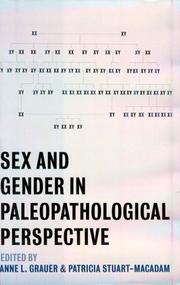| Listing 1 - 10 of 153 | << page >> |
Sort by
|
Dissertation
Abstract | Keywords | Export | Availability | Bookmark
 Loading...
Loading...Choose an application
- Reference Manager
- EndNote
- RefWorks (Direct export to RefWorks)
Book
Abstract | Keywords | Export | Availability | Bookmark
 Loading...
Loading...Choose an application
- Reference Manager
- EndNote
- RefWorks (Direct export to RefWorks)
Book
Year: 2006 Publisher: [Bethesda, Md.] : Office of Research on Women's Health, Office of the Director, National Institute of Allergy and Infectious Diseases, National Institutes of Health, Dept. of Health and Human Services,
Abstract | Keywords | Export | Availability | Bookmark
 Loading...
Loading...Choose an application
- Reference Manager
- EndNote
- RefWorks (Direct export to RefWorks)
Book
ISBN: 1283259915 9786613259912 9048521475 9789048521470 9781283259910 6613259918 9052603774 9789052603773 9789052603773 9052603774 Year: 2010 Publisher: Amsterdam Aksant
Abstract | Keywords | Export | Availability | Bookmark
 Loading...
Loading...Choose an application
- Reference Manager
- EndNote
- RefWorks (Direct export to RefWorks)
In de negentiende eeuw leken sommige vrouwen waanzinnig te worden door een gebrek aan gedragsvrijheid. Van de universele remedie tegen gekte in die dagen, een rustkuur, werden zij niet altijd beter. Eind twintigste eeuw lijken sommige vrouwen juist te bezwijken onder de last van de vrijheid. Het beeld bestaat dat de eisen die de post-feministische samenleving hen oplegt om carrière te maken, er prachtig uit te zien en een flitsend sociaal leven te leiden hen te veel wordt, met nieuwe ziektebeelden als burn-out tot gevolg. Gender en gekte, hoe verhouden deze twee grootheden zich tot elkaar? Dit
Periodical
Year: 2014 Publisher: Singapore : ISEAS Publishing,
Abstract | Keywords | Export | Availability | Bookmark
 Loading...
Loading...Choose an application
- Reference Manager
- EndNote
- RefWorks (Direct export to RefWorks)
The subject of gender, as it emerged in late twentieth-century social demography, has commonly been approached as a potential marker of disadvantage, particularly as experienced by women. In the Indonesian case, at least, we have seen that, even where gender differences serve as powerful mechanisms of individual and group identity, intergenerational relationships and flows of support are guided by flexible network arrangements that in most cases secure support of both sons and daughters. There are, moreover, major differences in the way Indonesian cultures configure gender, which we have summarized and contrasted very briefly as preferential (for support from daughters, in the Javanese and Sundanese communities) and prescriptive (the Minangkabau maintain a powerful gender ideology emphasizing female lines of descent, inheritance, and family arrangement in which preferences regarding ongoing material support nonetheless rely on both sexes). In sum, gendered support, while important to older people's perception of their situation, and often in the patterns of assistance they actually receive, is not determinant of levels of support or of the diverse network arrangements by which family and community networks respond to elderly needs.
Periodical
Year: 2014 Publisher: Singapore : ISEAS Publishing,
Abstract | Keywords | Export | Availability | Bookmark
 Loading...
Loading...Choose an application
- Reference Manager
- EndNote
- RefWorks (Direct export to RefWorks)
The subject of gender, as it emerged in late twentieth-century social demography, has commonly been approached as a potential marker of disadvantage, particularly as experienced by women. In the Indonesian case, at least, we have seen that, even where gender differences serve as powerful mechanisms of individual and group identity, intergenerational relationships and flows of support are guided by flexible network arrangements that in most cases secure support of both sons and daughters. There are, moreover, major differences in the way Indonesian cultures configure gender, which we have summarized and contrasted very briefly as preferential (for support from daughters, in the Javanese and Sundanese communities) and prescriptive (the Minangkabau maintain a powerful gender ideology emphasizing female lines of descent, inheritance, and family arrangement in which preferences regarding ongoing material support nonetheless rely on both sexes). In sum, gendered support, while important to older people's perception of their situation, and often in the patterns of assistance they actually receive, is not determinant of levels of support or of the diverse network arrangements by which family and community networks respond to elderly needs.
Book
ISBN: 0128118512 0128118504 9780128118511 9780128118504 Year: 2017 Publisher: London, England : Academic Press,
Abstract | Keywords | Export | Availability | Bookmark
 Loading...
Loading...Choose an application
- Reference Manager
- EndNote
- RefWorks (Direct export to RefWorks)
Sex factors in disease. --- Diseases --- Pathology --- Sex differences --- Sex factors

ISBN: 0521620902 Year: 1998 Publisher: Cambridge : Cambridge university press,
Abstract | Keywords | Export | Availability | Bookmark
 Loading...
Loading...Choose an application
- Reference Manager
- EndNote
- RefWorks (Direct export to RefWorks)
Paleopathology. --- Sex differences. --- Sex factors in disease.
Dissertation
Year: 1978 Publisher: S.l. s.n.
Abstract | Keywords | Export | Availability | Bookmark
 Loading...
Loading...Choose an application
- Reference Manager
- EndNote
- RefWorks (Direct export to RefWorks)
Language Development --- Sex Factors --- Sex Differentiation
Dissertation
Year: 1985 Publisher: Liège : Université de Liège. Faculté de Médecine. Institut supérieur d'éducation physique,
Abstract | Keywords | Export | Availability | Bookmark
 Loading...
Loading...Choose an application
- Reference Manager
- EndNote
- RefWorks (Direct export to RefWorks)
REACTION TIME --- SEX FACTORS --- TENNIS --- EVOKED POTENTIALS
| Listing 1 - 10 of 153 | << page >> |
Sort by
|

 Search
Search Feedback
Feedback About UniCat
About UniCat  Help
Help News
News